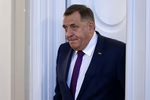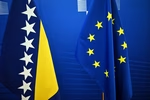Unusual maneouvers surrounding the sale of Telecom Albania: Competitors on the Bulgarian market, partners on the Albanian

For a while now, Austrian and Bulgarian investigative journalists have been investigating the sale of Telecom Albania. Bulgarian investors who had bought Telecom Albania and subsequently sold it - for a large profit - to a Hungarian telecommunications company, are actually competitors on the Bulgarian telecommunications market. The investigation has found no irregularities, but questions remain.
At the centre of a joint investigation by the Austrian Der Standard and Bulgarian journalists from the BIRD investigative collective is the sale of the second-largest Albanian telecommunications operators, ONE Telecommunications.
OTE, owned by the German Deutsche Telecom, sold the operator in 2019 to the Albania Telecom Invest (ATI) for only €50 million. The Bulgarian investors behind the undertaking sold the company last year to the Hungarian company 4iG, for €120 million.
According to the revelations by the Bulgarian media, the managers of the two largest telecommunications companies in Bulgaria, A1 and Vivacom, cooperated during the last year’s – very profitable – sale to the Hungarians. The two are competitors in Bulgaria, but, as the media reports, “they do business together” in Albania.
Furthermore, apart from Elvin Guria, a Bulgarian entrepreneur with Albanian roots, the owner of the Albania Telecom Invest was also Atanas Dobrev who was the CEO of the Bulgarian Vivacom at the time of the sale in 2019. Mariana Nikolova Dimitrova, the wife of A1 Bulgaria’s CEO Alexander Dimitrov, was also included in the proces of selling the operator to 4iG.
Austrian investigation found no irregularities
According to BIRD, this case has prompted the stakeholders in A1 to begin an investigation into Dimitrov at A1’s HQs in Vienna. Auditors of the ProcewaterhouseCoopers Austria (PwC) investigated the role Dimitrov played in the transaction, as he had allegedly participated as a hidden investor in 2019 in a business that ended with the sale of Albania Telecom to the Hungarian company 4iG in 2019.
“Although the investigation by PwC has corroborated most of the facts claimed by the anonymous whistleblower, PwC has found no irregularities or Dimitrov’s culpability,” the Bulgarian portal reports.
“The results of the investigation reveal that there was no breach of rules and principles of corporate responsibility, and no valid laws and regulations were violated. The investigation concluded that the case concerned a personal matter, one that did not affect A1’s business in Bulgaria or any other country in which A1 operates. Compliance rules are firmly rooted in the culture of A1 Group and its Bulgarian branch. Following strict compliance rules shapes the behaviours and attitudes of all our managers and employees,” A1 Group said in a press release.
Questions without answers
Austrian and Bulgarian investigative journalists sent questions about the dealings to all involved parties, but they received no responses.
There is also no response to reporters’ questions from A1’s headquarters in Vienna, as well as from the Austrian government, the second-largest shareholder of A1.
Reporters asked the Austrian government’s PR office whether they had requested additional explanations as A1’s stakeholders, as well as do they still, as owners of stake in the company, trust the A1 Bulgaria chairman. They received no response.
A1’s headquarters in Vienna is similarly quiet. A1’s code of conduct states that employees “must avoid situations which could leave an impression that business decisions are made based on personal interests.” They did not respond to the question about honoring the code, as well as a series of other questions, such as: how did Dimitrov explain the case? Do they find it logical that he would invest through a complicated structure of companies if his business dealings in Albania were not suspicious?
Hungarian tactics
BIRD also reports that the Albanian telecommunications industry is one goal of Hungarian geopolitical play. According to BIRD, Hungarian companies have started to increase their presence in Albanian economy over the last few years. Not only are they generating profit, they are also building a network of political influence in the Balkans.
Last March, when 4iG bought a stake in One Telecommunications from ATI, at the same time they also became owners of over 80 percent of ALBTelecom, the third largest operator on the Albanian market. In January this year, 4iG merged the two companies. Through recapitalisation, they transferred their shares to the state-owned Antena Hungaria, thus making the Hungarian state the owner of Albanian telecommunications.
After the acquisitions, the Albanian market has become a de facto duopoly of 4iG and Vodafone.
Grand plans
“Hungary has big plans for 2024. In the second half of next year, they will take over the Presidency of the EU. Above all they will advocate the speedy accession of six southeast European countries into the EU. Over the last several years, Hungary has not only ensured its political influence, especially in Serbia and among Serbian nationalists in Bosnia and Herzegovina, but also, Hungarian representatives have taken over key positions in the area of security. In 2024, Hungary will take over EUFOR, European peacekeeping troops in Bosnia and Herzegovina. Apart from all that, they are becoming an increasingly important economic player in the region,” the report states.
Mario Holzner of the Viennese Institute for International Economic Studies says that Hungary is above all involved in the areas where a large technological contribution is not necessary.
“Their goal is to become the leading power in the region. That’s the geoeconomic plan,” he said.
Kakvo je tvoje mišljenje o ovome?
Učestvuj u diskusiji ili pročitaj komentare





 Srbija
Srbija
 Hrvatska
Hrvatska
 Slovenija
Slovenija



























































